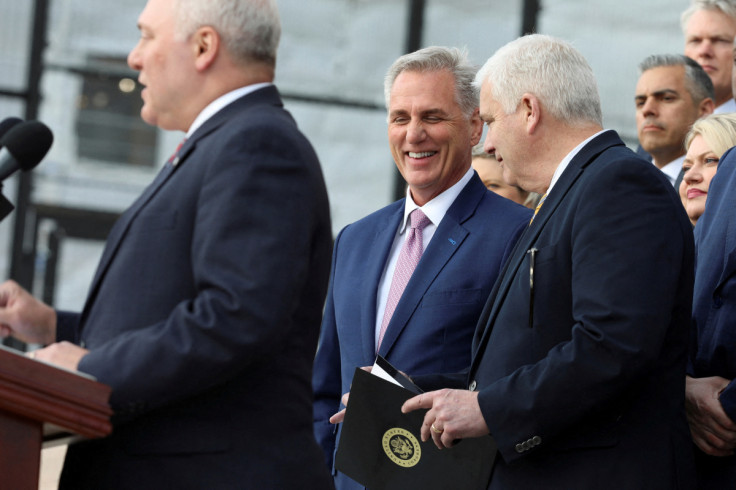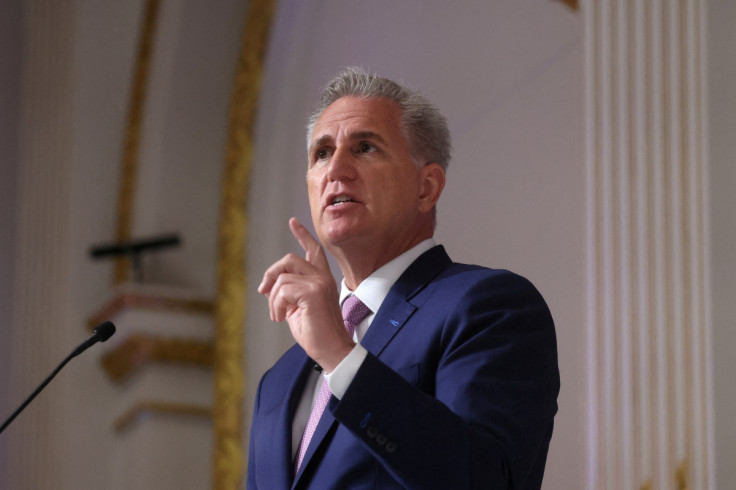Republican McCarthy Eyes $1.5 Trln Lift Of US Debt Ceiling, Spending Cuts

Republican U.S. House Speaker Kevin McCarthy on Wednesday unveiled a plan to raise the nation's debt ceiling by $1.5 trillion and cut federal spending by three times that amount, laying out an opening position in what is likely to be a tense partisan debate over increasing the government's borrowing authority.
McCarthy's proposal, which he unveiled on the floor of the House of Representatives, would cut some types of federal spending to 2022 levels and cap growth at 1% annually in years to come. It would not touch retirement and health programs that are projected to expand dramatically as the population ages.
The plan also would repeal green-energy incentives signed into law by Democratic President Joe Biden last year, boost domestic oil and gas production and scrap Biden's $400 billion student-loan forgiveness effort, McCarthy said.
McCarthy said the package would lower spending by $4.5 trillion.
Those proposals are likely to be rejected by Biden and the Democratic-controlled Senate. McCarthy said they would serve as the basis for negotiations between the two parties over raising the $31.4 trillion debt limit in the coming months. Washington will have to increase the nation's borrowing authority to avoid defaulting on previously approved spending.
"President Biden has a choice: Come to the table and stop playing partisan political games, or cover his ears, refuse to negotiate and risk bumbling his way into the first default in our nation's history," McCarthy said on the House floor.
He did not say when the House of Representatives, which his Republicans control by a narrow 222-213 majority, would vote on the plan.
The White House reiterated its position that Congress should raise the $31.4 trillion debt limit without conditions, as it did three times under Biden's Republican predecessor, Donald Trump.
At an appearance outside Washington, Biden said Republicans were threatening to push the United States into a historic default that would shake the world economy.
"Who do you think will hurt the most? You hardworking people, the middle class," he said.
POTENTIAL CONSEQUENCES
The U.S. federal government has already reached the borrowing limit and by this summer is expected to hit a point where it will no longer be able to meet its financial obligations without action by the divided Congress. That would trigger a historic default that would shake the U.S. and world economies.
The $1.5 trillion increase proposed by McCarthy could cover the government's needs until early next year, setting the stage for another debt ceiling fight in the final months of the 2024 presidential election campaign.
McCarthy leads a fractious caucus that includes a sizeable contingent of hardline members who want sharp spending cuts and dismiss the risks of failure to act on the debt ceiling. So far House Republicans have not produced a budget plan of their own, a move that Biden contends would be a necessary starting point for negotiations on spending.
The White House last month proposed its own budget, which it said would cut the nation's deficit by nearly $3 trillion over 10 years, largely through increased taxes on businesses and the wealthy, rather than spending cuts.

© Copyright Thomson Reuters {{Year}}. All rights reserved.





















